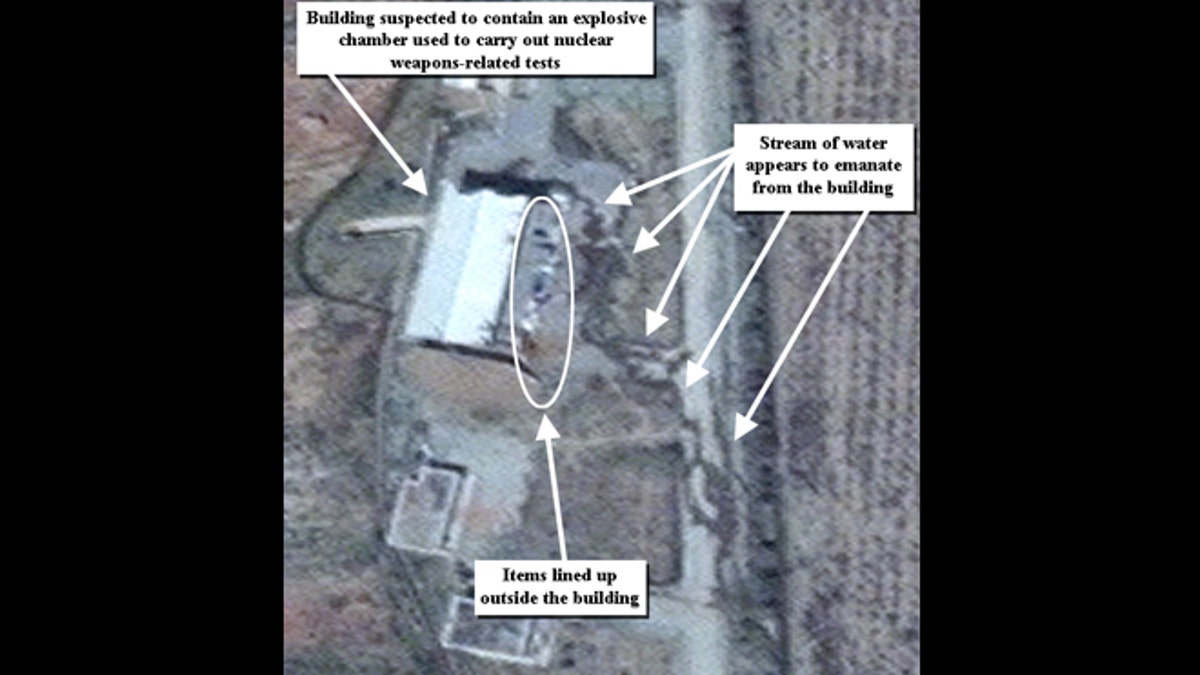
This April 9, 2012 file photo photo provided by the Institute for Science and International Security, ISIS shows suspected cleanup activities at a building alleged to contain a high explosive chamber used for nuclear weapon related tests in the Parchin military complex in Iran. A U.S. institute tracking Iran's nuclear program said Thursday Aug. 22, 2013 that recent satellite images of the Parchin military complex it has analyzed show further major alterations of a military site that the U.N. has long tried to access to follow up suspicions that Tehran may have used it in attempts to develop atomic arms. (AP/ISIS)
Iran has significantly expanded its uranium enrichment capacity at one nuclear plant, installing around 1,000 advanced centrifuges that are set to undergo testing, a new U.N. watchdog report says.
The International Atomic Energy Agency's quarterly report also says Iran has started making fuel assemblies for a nuclear reactor that Western powers fear could yield bomb material, according to Reuters.
The confidential report was released Wednesday to the agency's 35 board member nations and the U.N. Security Council. It said Iran had installed about 300 more of its advanced centrifuges since the last report in May, for a total of 1,008, and had put all of them under vacuum.
Such a move is normally one of the last steps before the machines start spinning uranium gas into the material that can be used either as reactor fuel or as the core of nuclear warheads, depending on its enrichment level.
The report also said Iran had installed more of its older-generation centrifuges to bring up their number to more than 15,000, with most of them running. But most concerns are likely to be generated by the pre-start up work on the high-tech IR2-m centrifuges because they are three to four times more effective than the older IR-1 machines.
In addition to putting the existing IR2-ms under vacuum, pre-installation work was continuing for about 2,000 additional advanced centrifuges, said the report.
Summarizing the progress of construction of the plutonium-producing reactor at Arak, in central Iran, the IAEA noted some advances. At the same time it cited an Iranian letter telling the agency that due to unspecified delays the startup date was "not achievable, so it cannot be the first quarter of 2014."
That target date, previously cited by the Islamic Republic, has been described as unrealistic by nuclear experts who say the reactor is unlikely to be operating before sometime in 2015 at the earliest.
The report -- which is the first since Hassan Rouhani won Iran's June presidential election -- also said Iran's stockpile of uranium gas has grown little since May 2012, and is still below Israel's "red line," which could provoke military action, Reuters reports.
Iran has long stated that its nuclear ambitions are for peaceful purposes, but the West fears they may be geared toward the creation of weapons.
The report also confirmed that the IAEA and Iranian experts have agreed to restart talks focused on the agency's attempts to probe suspicions of nuclear weapons development. News of the planned Sept. 27 meeting was revealed first to The Associated Press earlier Wednesday.
The Sept. 27 Iran-IAEA talks focus on gaining access to a section of the Parchin military site that the agency has long tried to access.
Before the talks were suspended earlier this year, IAEA experts met Iranian negotiators 10 times over 18 months in futile efforts to start their probe of the area, southeast of Tehran. The agency suspects that the location was used by the Islamic Republic to test conventional explosive triggers for a nuclear blast.
Under former President Mahmoud Ahmadinejad, Iran blamed the IAEA for the standoff over Parchin, saying it is caused by the agency's refusal to agree on strict parameters that would govern its probe. The agency in turn says such an agreement would tie its hands by putting limits on what it could look for and whom it could question. It bases its suspicions of nuclear-weapons research and development by Iran on its own research and intelligence from the U.S., Israel and other Iran critics.
IAEA chief Yukiya Amano told reporters earlier this year he was concerned about satellite images showing asphalt work, soil removal, and "possible dismantling of infrastructures" at Parchin. Iran says such activities are part of regular construction that has nothing to do with alleged attempts to cleanse the area of evidence. But Amano said that because of such activities, "it may no longer be possible to find anything even if we have access to the site."
Repeating previous comments in Wednesday's report, Amano said that unless Iran decides to fully cooperate with the agency, the IAEA cannot shut the book on its probe and "conclude that all nuclear material in Iran is in peaceful activities."
The Associated Press contributed to this report.






































